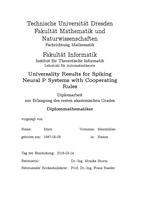Universality Results for Spiking Neural P Systems with Cooperating Rules
Aus International Center for Computational Logic
Universality Results for Spiking Neural P Systems with Cooperating Rules
Maximilian MarxMaximilian Marx
Maximilian Marx
Universality Results for Spiking Neural P Systems with Cooperating Rules
Diploma thesis, Technische Universität Dresden, March 2016
Universality Results for Spiking Neural P Systems with Cooperating Rules
Diploma thesis, Technische Universität Dresden, March 2016
- KurzfassungAbstract
Metta et al. introduced the concept of Spiking Neural P systems with cooperating rules, bringing the ideas behind cooperating distributed grammar systems (CD grammar systems) to the world of Spiking Neural P systems (SN P systems), a model for computation inspired by the functioning of neurons in a nervous system. An essential feature in these systems is the cooperation of multiple components according to some fixed cooperation protocol. We provide a comprehensive introduction to the theory of these systems, as well as an overview of the underlying models of both CD grammar systems and SN P systems. Building on the proof by Metta et al. for the terminating protocol, we show that universality can be retained for the other cooperation protocols by slightly lifting some of the model's restrictions, such as using the maximally parallel mode of derivation instead of the strongly sequential mode, or allowing for local synchronization in the asynchronous case. We present a concrete example demonstrating the power of the model by generating a non-semi-linear (and hence non-context-free) set of numbers, and contrast it with a CD grammar system generating the same set. We conclude by listing some remaining open questions and opportunities for further research in the area. - Weitere Informationen unter:Further Information: Link
- Forschungsgruppe:Research Group: Wissensbasierte SystemeKnowledge-Based Systems
@misc{M2016,
author = {Maximilian Marx},
title = {Universality Results for Spiking Neural P Systems with Cooperating
Rules},
year = {2016},
month = {March}
}
